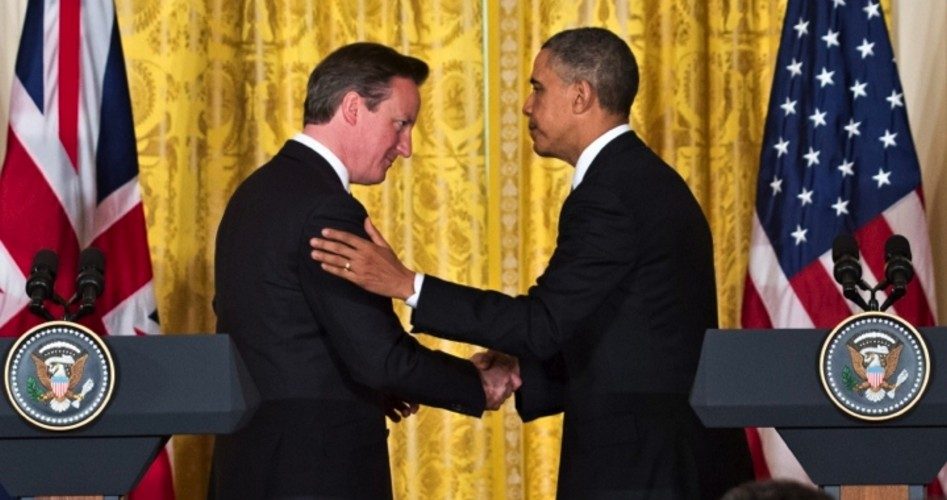
The Obama administration has warned British officials that if the U.K. leaves the European Union, it will exclude itself from the proposed Transatlantic Trade and Investment Partnership (TTIP), which may cost Britain hundreds of billions of pounds a year.
According to a May 27 article in the British Guardian, U.S. officials said that should Britain exit the EU, it would be unlikely that the United States would establish a separate trade agreement with the U.K.
The Guardian report cited sources at U.S.-U.K. meetings in London who speculated that withdrawal of Britain from the EU would make approval of the TTIP by Congress even more difficult than it already is. The sources said “there would very little appetite” in Washington to put a new trade deal together with Britain if the U.K. left the EU.
“Having Britain in the EU … is going to strengthen the possibility that we succeed in a very difficult negotiation, as it involves so many different interests and having Britain as a key player and pushing for this will be important,” the Guardian quoted an unnamed senior U.S. official as saying. “We have expressed our views of Britain’s role in the EU and they haven’t changed. TTIP negotiations underscore why we think it’s important that it continues.”
During a joint White House press conference on May 13 in which both President Obama and British Prime Minister David Cameron took questions from press corps members, Obama stated:
[Cameron and I] discussed the importance of moving ahead with the EU towards negotiations on the Transatlantic Trade and Investment Partnership. Our extensive trade with the U.K. is central to our broader transatlantic economic relationship, which supports more than 13 million jobs. And I want to thank David for his strong support for building on those ties, and I look forward to launching negotiations with the EU in the coming months.
When it was his turn to address the press corps, Cameron also touched on the Transatlantic Trade deal: “President Obama and I have both championed a free trade deal between the European Union and the United States. And there is a real chance now to get the process launched in time for the G8.” (The 39th G8 summit will be held on June 17-18 in Northern Ireland.)
James Landale of the BBC asked Cameron and Obama the following questions:
Prime Minister, you’re talking here today about a new EU-U.S. trade deal, and yet members of your party are now talking about leaving the European Union. What is your message to them and to those pushing for an early referendum? And if there were a referendum tomorrow, how would you vote?
And, Mr. President, earlier this year you told David Cameron that you wanted a strong U.K. in a strong EU. How concerned are you that members of David Cameron’s Cabinet are now openly contemplating withdrawal?
Cameron answered first, saying:
There’s not going to be a referendum tomorrow…. because it would give the British public I think an entirely false choice between the status quo — which I don’t think is acceptable. I want to see the European Union change. I want to see Britain’s relationship with the European [Union] change and improve. So it would be a false choice between the status quo and leaving. And I don’t think that is the choice the British public want or the British public deserve….
Is it in the national interest of Britain to have a transatlantic trade deal that will make our countries more prosperous; that will get people to work; that will help our businesses? Yes, it is. And so we will push for this transatlantic trade deal.
Is it in our interests to reform the European Union to make it more open, more competitive, more flexible, and to improve Britain’s place within the European Union? Yes, it is in our national interest.
Responding to the question about any concerns he might have about the U.K. leaving the EU, Obama largely avoided answering the question:
We have a special relationship with the United Kingdom. And we believe that our capacity to partner with a United Kingdom that is active, robust, outward-looking and engaged with the world is hugely important to our own interests as well as the world. And I think the U.K.’s participation in the EU is an expression of its influence and its role in the world, as well as obviously a very important economic partnership.
A May 13 Reuters news report on the Obama-Cameron joint press conference observed that “Eurosceptics in Cameron’s Conservative Party see the European Union as an oppressive, interfering and wasteful ‘superstate’ that threatens Britain’s sovereignty and puts an excessive regulatory burden on its companies.”
The EU’s growing unpopularity in Britain has spawned the creation of a new, anti-EU political party, the UK Independence Party (UKIP). The UKIP did so well in recent local elections that some members of Cameron’s Conservative Party fear it will split the center-right vote.
Reuters cited UKIP leader Nigel Farage, who said that the only way Cameron can solve his foreign policy problems related to the EU would be to hold a referendum before the next election.
“If he doesn’t, then I think he will go on leading a party that is hopelessly split,” Farage told the BBC. “The dam has broken. I think the politics that dare not speak its name has now become mainstream.”
Farage also told the BBC’s Daily Politics that he was “open minded” about backing at the next election some Conservative or Labour MPs who wanted U.K. withdrawal from the EU.
The BBC reported on May 13 that 70 members of Parliament had so far supported having a vote to establish an EU referendum.
As noted earlier, from the perspective of the Obama administration, the British debate over whether to remain in the EU is seen as having an impact on administration efforts to gain congressional approval of the Transatlantic Trade and Investment Partnership (TTIP). A writer for the Guardian noted that Cameron’s visit to Washington “was primarily intended as a joint promotion of the … TTIP.”
President Obama has invested considerable political capital in both the TTIP and the Trans-Pacific Partnership (TPP). In his State of the Union Address to Congress on February 12, 2013, President Obama declared:
To boost American exports, support American jobs and level the playing field in the growing markets of Asia, we intend to complete negotiations on a Trans-Pacific Partnership. And tonight, I’m announcing that we will launch talks on a comprehensive Transatlantic Trade and Investment Partnership with the European Union — because trade that is fair and free across the Atlantic supports millions of good-paying American jobs.
Those who have studied the history of the TTIP warn of the threat it presents to U.S. sovereignty. As The New American noted in the article “Secretly Trading Away Our Independence,”
This is not idle speculation; we have it on the direct authority of the TTIP authors. One of those authors was the late Warren Christopher, who served as secretary of state to President Clinton and was a foreign policy advisor to President Obama.
In a speech entitled “Charting a Transatlantic Agenda for the 21st Century,” in Madrid, Spain, on June 2, 1995, Secretary Christopher declared: “The long term objective is the integration of the economies of North America and Europe, consistent with the principles of the WTO.” This, he averred, “will align our efforts to promote transatlantic integration with the forces of integration around the world.”
Those wary of transatlantic integration will undoubtedly view the recent conspicuous efforts of President Obama to bolster Prime Minister Cameron’s campaign to keep Britain in the EU with much suspicion.
Photo of Prime Minister David Cameron and President Barack Obama: AP Images
Related articles:
Secretly Trading Away Our Independence
CFR Applauds European Union’s “Real Subversion of Sovereignty”

